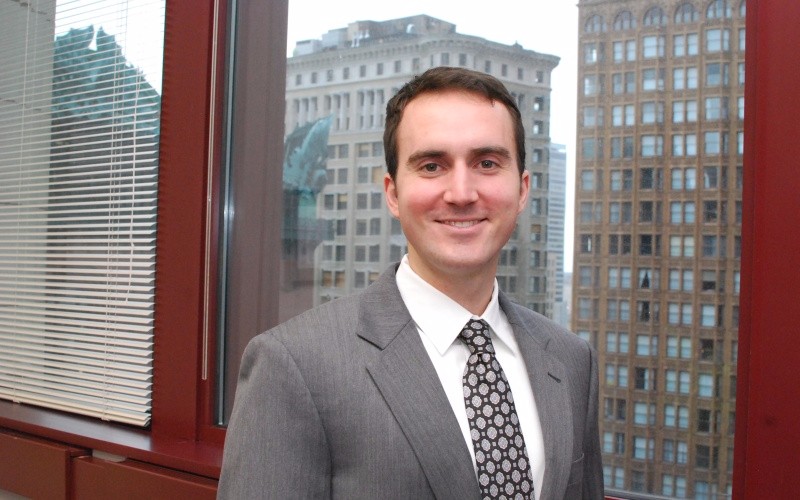Timothy Fox seemed destined for a career in predictive analytics.
With an aptitude for higher-order math and a penchant for analyzing figures, it seemed only predictable he'd get a math or computer science degree and start mining data.
And yet, he found he enjoyed economics and history just as much as the quantitative subjects.
As he began to explore post-graduate options, he realized he wanted a career path that blended the quantitative and qualitative aspects of human behavior.

It was his interest in understanding human behavior and its statistical ramifications that drew him to DePaul University's Master of Science in Economics and Policy Analysis degree program.
"I do find it fascinating how people interact with each other," says Fox, who graduated from the program last spring. "But I did want to figure out ways in which to quantify that interaction. DePaul's MS in Economics allowed me to delve further into economic theory and how it applies to the understanding of societal and business interactions."
Pairing Economics and Big Data
While most people think predictive analytics is all about stats and numbers, Fox says in practicality it's sifting through a large array of unorganized content and finding a sliver of context. And this is the sweet spot of economics.
"Predictive analytics requires a really broad skills set," says Fox an advanced analytics consultant at West Monroe Partners LLC. "The overall objective of predictive analytics is to gain insight from data. With economics there’s a whole lot that goes into understanding, not just the data itself, but the context behind the data. What's the business situation?
"What's the framework in which you're studying the data? Numbers, plus context – that's the difference you get with economics. Economics gives you a unique perspective of the world and how to solve problems within really any sort of context."
Economics Courses Teach Necessary Job Skills
Fox's job requires him to use statistics, econometrics and machine-learning algorithms to make large sets of messy data into something meaningful. With classes in econometrics, research methodologies, data inspection, advanced statistical modeling and forecasting, Fox says DePaul's MS in Economics aptly prepared him for his job.
For example, Fox says, it's rare that analysts receive a nice, clean data set to explore. Most of the time, data is buried in a litany of different sources, and analysts have to collect, clean up and prepare data before even beginning to analyze it.
The MS in Economics requires students to learn and use Stata, a data analysis and statistical software tool used by industry leaders. Fox says he used it on many class projects to make data make sense.
"DePaul's program allows you to be flexible with how to learn economics, as well as providing opportunities to take additional math and statistics classes so that you learn the different skill sets that are required to really harness the power, the problem-solving horsepower, of economics," says Fox.
Economics Degree Offers Great Job Prospects
Forbes.com called the MS in Economics one of the top 30 degrees for today's job market. DePaul's MS in Economics is unique because it goes beyond the scope of focusing on government and business allocation of resources to include a rigorous analytics component that offers students practical statistical and data analysis skills used by myriad industries and fields.
"We knew that there were jobs waiting for students who had the right blend of a deep understanding of economic theory and the ability to apply that knowledge to real-world situations," says Thomas Donley, chair of the Department of Economics at the Driehaus College of Business. "That's why this degree was created."
Read more about DePaul's MS in Economics and Policy Analysis.